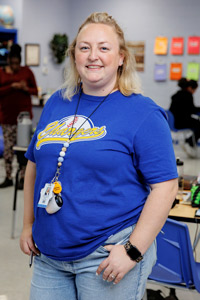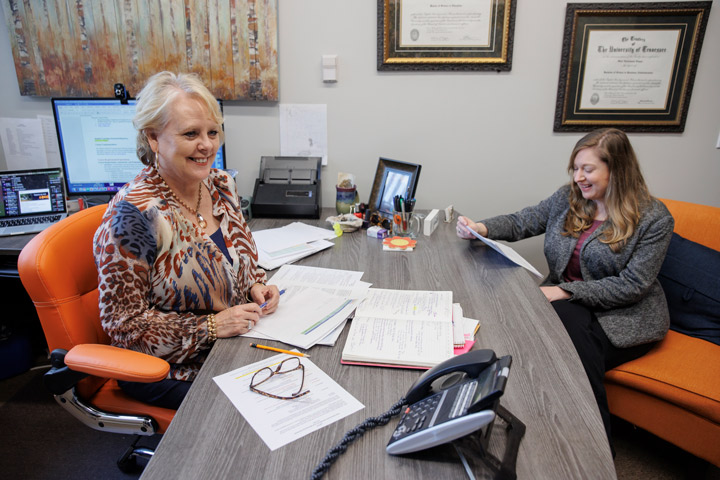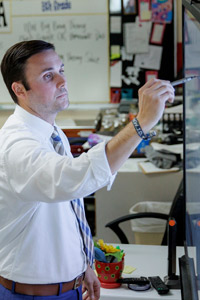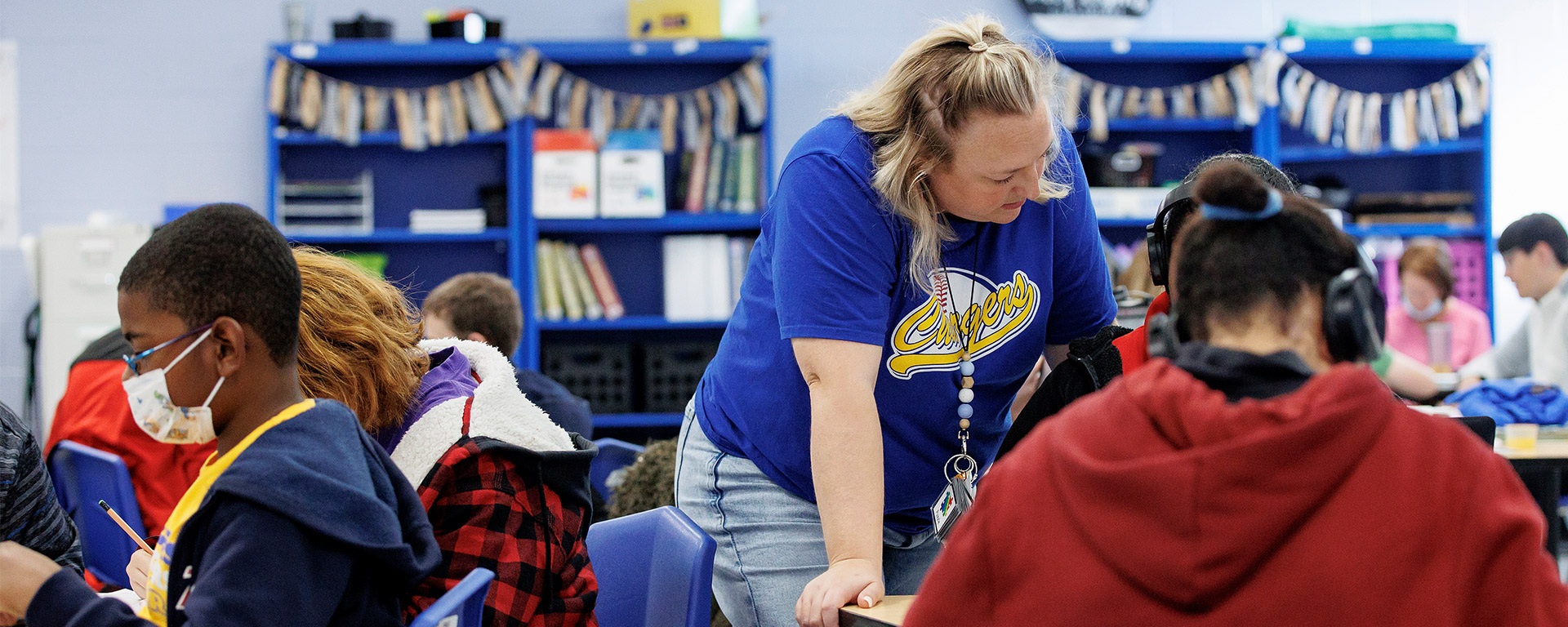Raised with a cousin and uncle who had disabilities, Betsy Logan (Martin ’22) knew she wanted to work with children in special education as she pursued a child-development degree at California State University, Fresno.
The Manteca, California, native recently completed a master’s degree in education at UT Martin and teaches special education at Martin Middle School.
“There are definitely hard days, but there’s never a day that I don’t come back and say I don’t want to do this anymore,” she says.
Logan is among many Tennessee educators who are products of UT Martin’s educator preparation program. UT Martin is, perhaps surprisingly, the third-largest producer of teachers in the state behind Tennessee Tech University and Middle Tennessee State University. In the past three years, UT Martin’s educator program boasts 729 graduates serving in 66 Tennessee counties.
The education department supports 34 K-12 UT Martin licensure programs. Logan is counted among the 160-plus job-imbedded completers who are supported by the educator prep’s Induction Program, which ensures that candidates have necessary support to be successful teachers for three years after graduation.
Inspired to help others

With her family background, Logan was already empathetic to persons who face disabilities as she pursued her undergraduate degree.
“I think just understanding that they need more help than others and that they could be successful helped me learn that I needed to help other people in my area as well,” she says.
After more than three years working in Monticello, Iowa, at Camp Courageous, which offers recreational and respite-care opportunities for individuals with special needs and their families, Logan decided to return to school to become a teacher.
She moved to Tennessee during the pandemic to be closer to family and enrolled at UT Martin. She initially worked as a classroom aide but then learned of a job opening at Martin Middle School. Logan was hired and, in the fall of 2021, began her first full year of teaching, which allowed her to work while completing her master’s degree and earn her teaching license.
“I had no idea that I could do that, so I was very excited,” she says.
If any day can be described as typical, students arrive at 7:15 a.m., she discusses with them the plan for the day, and then they go to physical education.
“We try to have our normal academic schedule, but you just never know what hiccups are going to happen in the area of special ed because someone might be having a bad day and, well, you just never know what to expect,” she says.
Last year she taught students who had mild to moderate intellectual disabilities, but this year she’s working with the severe/profound and moderate special-needs students. This involves focusing more on social and life skills and preparing them for life after high school.
Logan’s keys to teaching success include flexibility, patience and reiterating what the students have learned by being creative.
“Sometimes just going off of what the book is saying doesn’t mean that they’re going to understand it,” she says. “You might have to twist it and be creative on your own to help them understand what they’re learning.”
Logan knows that she is making a positive difference when her students reach different stages of her curriculum and see that they’re achieving goals. The progress inspires them to set their own expectations for achievement.
“I would like to see them either have a job or just be successful in public on their own,” she says.
While some teachers are opting out of the profession, Logan sees herself right where she needs to be.
“I’m in it for the long haul. I’m not going anywhere,” she says. “I want to continue to help other students in the classroom, and I feel like this is where I’ve been striving to be for the last couple of years.”
Educator Prep Filling A Role to Educate Teachers
Staci Fuqua (Martin ’03, ’09) directs the educator prep and teacher-education accreditation programs.
“I’m very excited about the work the program is doing, and it’s an interesting time in education because there are so many changes that have come about in the last several years,” she says.
While K-5 teachers were once plentiful, they have joined the shortage list.
“Now we are seeing a shift in school-district needs. The shortage is not just in high-need areas such as special education, math and sciences—the shortage is in all areas. Now we have districts that we partner with that can’t fill positions in various grade levels and subjects because there’s not enough teachers,” she says.
Besides the program’s important role educating classroom teachers for the state, UT Martin also produces the largest number of career and technical educators in Tennessee. More than 350 have completed or are currently enrolled in the university’s career and technical program that trains these educators with industry skills such as welding.

UT Martin includes some special features in its education department, including an induction program that supports the job-imbedded program and provides three years of support for graduates who teach in partnering districts. Fuqua is optimistic that the induction program will increase teacher retention.
“We work with our program completers and school partners by reaching out to them to develop a plan of action to ensure that we’re supporting their needs,” she says. “We work with the principal, the supervisor of instruction and the graduate just to make sure that, if there’s anything we can do to make a difference, we are available for them.”
UT Martin also has the state’s only Call Me MiSTER program, which recruits and trains students from underrepresented backgrounds to become teachers. Created in 2000 at Clemson University, MiSTER stands for “Mentors Instructing Students Toward Effective Role Models” and has a goal to provide under-served socioeconomically disadvantaged and educationally at-risk communities with minority educators in elementary and middle schools. The UT Martin program is 5 years old and currently includes 14 “MiSTERs.”
New UT Martin initiatives include an integrated pre-K/special education program being submitted to the Tennessee Department of Education for approval in spring 2023 and a new recruitment and retention committee for undergraduate and graduate programs. The program also will be involved in the UT System’s Grow Your Own Center, funded by a $20 million grant from the Tennessee Department of Education, which aims to provide low-cost paths to the teaching profession.
“We are very passionate about this work, and I think that’s just what keeps us going,” Fuqua says of working with the future educators. “It’s because of the passion we have for our students and for this campus. We want to see all students be successful.”
Teachers See Possibilities Through WestTeach

While UT Martin prepares future classroom teachers, its WestTeach program adds to current teachers’ knowledge by showing them further resources available in West Tennessee. The program also aims to inspire participants to greater service in their respective schools and communities.
Paul Richards (Martin ’18) is a product of both UT Martin and WestTeach.
The teacher-development program was created as a class project by UT Martin’s 2017 WestStar Leadership Program. Prospective WestTeach participants must be K-12 teachers who want to remain in the classroom, and they must be recommended by their principal, director of schools or superintendent. Only one teacher per school district is chosen by WestTeach’s advisory board to participate.
Each WestTeach class member commits to four sessions that cover topics in agriculture, leadership, education partnerships for economic development and building communities. Despite missing one year because of the pandemic, Richards is among the 73 teachers who have completed WestTeach during the program’s short history.
Richards serves as the English as a Second Language supervisor and 504 coordinator for the Bradford Special School District. For him, becoming a teacher was a calling.
“Choosing to become a teacher was not a decision that I made with my mind but instead with my heart,” he says. “We are to leave this world better than we found it, and I have felt from a young age that this is what a teacher is meant to do.”
Richards first became aware of WestTeach through social-media posts from the inaugural 2018 class. He saw the program as an opportunity to grow professionally and learn about other school districts, and he was accepted into the 2019 class. He and his fellow class members learned that not all students will choose to pursue a bachelor’s degree following high school.
“I was able to observe that our students in the state of Tennessee are becoming incredibly drawn to the idea of attending trade schools following their graduations from high schools,” he says.
This information shaped curriculum and program ideas that he and classmates could take back to their school districts. Richards’ favorite of the four WestTeach sessions was in Dyersburg where the class participated in a forum with superintendents and state representatives.
“We were able to discuss the current status of the educational system and how we can better the learning experience for our students,” he says. “While the superintendents and the teachers discussed their topics with one another, our state representatives were making notes of our discussions to take back with them to Nashville for the General Assembly.”
Fueled by his time with WestTeach, Richards earned his first elected position in November when he won a Bradford city alderman seat in which he will serve a six-year term.
Participation in WestTeach and other professional-development opportunities isn’t possible without support from the schools. Dan Black, superintendent of the Bradford Special School District, says the program is beneficial for teacher development.
“I would encourage any of my teachers to be a part of it, and I would take care of anything that they need to be a part of it,” Black says. “It (WestTeach) just helps them become better at what they do and understand the surroundings that we have in West Tennessee.”
Teachers interested in applying for a future WestTeach class may do so at utm.edu.
Collaborative Learning
UT President Randy Boyd’s message to “Be One UT” while addressing the state’s Grand Challenges is realized in an ongoing collaboration between the educator preparation programs at Martin and Knoxville. UT Martin agreed to be one of UT Knoxville’s partners to pilot the newly created Foundational Skills and Trauma Informed Practices modules.
The completed foundational skills modules prepare future teachers to teach various literacy components such as phonological awareness and phonics, which is the current classroom approach to literacy instruction. The trauma-informed module gives future teachers the knowledge needed to help address trauma-informed situations, such as abuse, neglect or behavior and emotional issues.
“There’s been such a change in the dynamics of people’s lives, specifically over the last few years. The goal of the modules is to provide the skills so that candidates will be prepared to address those changes,” Staci Fuqua, UT Martin education preparation program director, says.
So far, the collaboration is a success and continues.
“The module work was a major initiative that the state department supported and has now made available to other programs across the state,” she says. She sees this partnership as an example of how the “Be One UT” ideal can make a difference.
“We all work together sharing ideas quite often,” Fuqua says of the UT collaboration. “And, in all the years I’ve worked here, I’ve never seen a stronger collaboration across campuses.”



